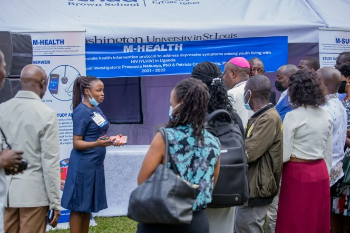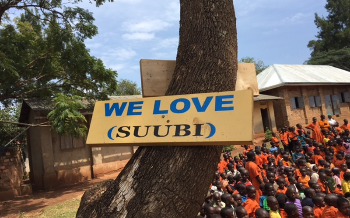|
|

|
September 2022 | ICHAD & SMART Africa Monthly Monitor
|
|
|
|
|
|
Greetings from the ICHAD and SMART Africa Teams!
|
ICHAD and our affiliates are celebrating four new research grants, totaling over $5 million in funding from the National Institutes of Health (NIH). These studies use innovative approaches to improve HIV treatment and mental health, refugee mental health, and substance use prevention. Read about each project below. In addition, we kicked off the new season of the ICHAD Speaker Series with a talk presented by Dr. Leyla Karimli titled, Economic strengthening interventions among female caregivers in Sub-Saharan Africa: underlying mechanisms of its effects. If you missed it, you can view the recording on the link in the sidebar under ICHAD Speaker Series. And each fall, we welcome new student research assistants who are integral to supporting and enhancing the work of our productive research teams. We warmly welcome Solomon, Lawrence, and Peter!
Looking ahead, we are eagerly anticipating our October speaker, Dr. John Naslund (see details in the sidebar). And in November, we are looking forward to opening applications for the LEAD Global Training Program and Researcher Resilience Training Program.
In partnership,
The ICHAD and SMART Africa Teams
|
|
|
ICHAD awarded over $5 million in new NIH funding for 4 new research projects
|
ICHAD has recently received over $5 million for four new research grants funded by the National Institutes of Health (NIH). Building on our intervention research studies aimed at improving outcomes for children and families affected by HIV in resource constrained settings, these projects introduce a variety of new approaches to expand our understanding of the unique needs of our participant groups, as well as expanding their impact. ICHAD, along with our implementing partners, is thrilled to be launching the following projects in Uganda.
|

|
Suubi+Adherence4Youth (2022-2027)
Award: $3.2 million
Funding Partner: National Institute of Mental Health (NIMH)
Principal Investigators: Fred Ssewamala, William E. Gordon Distinguished Professor, Brown School, Washington University in St. Louis and John Sauceda, Assistant Professor of Prevention Science, University of California, San Francisco (UCSF)
For more information: https://ichad.wustl.edu/suubi-adherence-4-youth/
Suubi+Adherence4Youth will unpack and optimize the multi-component intervention titled Suubi (suubi means hope in Luganda) using the Multi-Phase Optimization Strategy (MOST), an engineering-inspired intervention framework. Suubi consists of 1) Financial Literacy Training; 2) Incentivized Matched Youth Savings Accounts with income-generating activities; 3) a manualized intervention for ART adherence and stigma reduction; and 4) Engagement with HIV treatment-experienced role models who share lived experiences of HIV. This new study responds to the calls for expanding differentiated care approaches for adolescents living with HIV (ALHIV) and new forms of HIV combination interventions, by seeking to intervene in social and structural inequities that intensify the risk for high viral loads. Addressing these hardships can improve the livelihoods of ALHIV and give them the knowledge and resources to reliably manage their HIV care.
|
"In order to improve the lives of ALHIV, Suubi+Adherence4Youth will help us decide which intervention component or components are critical in achieving viral suppression in cost-effective ways among these youths. Results from this study will not only advance intervention science for HIV care globally, but will also build the evidence base for policymakers in resource-constrained settings, for the best return on public health investment.” - Fred Ssewamala
|

|
Suubi-Mhealth (2022-2027)
Award: $1.2 million
Funding Partner: National Institute of Mental Health (NIMH)
Principal Investigators: Proscovia Nabunya, Assistant Professor, Brown School and Co-Director of the International Center for Child Health and Development (ICHAD); and Patricia Cavazos-Rehg, Professor of Psychiatry, School of Medicine at Washington University in St. Louis; James Mugisha, Senior Researcher, College of Health Sciences, Makerere University, Uganda
For more information: https://ichad.wustl.edu/suubi-mhealth/
Suubi-Mhealth will develop a mobile health intervention for use among Ugandan youth with comorbid HIV and depression taking into account their unique contextual, cultural, and developmental needs. The core of the Suubi-Mhealth intervention will be based on cognitive-behavioral therapy (CBT) tenets found to improve depression and treatment adherence among individuals living with HIV.
This study builds on the pilot funding from Washington University’s McDonnell International Scholar’s Academy Global Incubator Seed Grant Program awarded to Nabunya and Cavazos-Rehg, in collaboration with Makerere University in Uganda—a McDonnell Partner. The study was implemented by the ICHAD field office in Masaka, Uganda.
“Digital intervention strategies addressing depression plus HIV treatment adherence among youth in sub-Saharan Africa are almost non-existent,” Nabunya said.
Cavazos addes, "Given the many barriers to care experienced by Ugandan youth living with HIV, as well as the lack of access to trained providers the Suubi-Mhealth intervention is a viable and sustainable approach for treating depression in this priority population.”
This study will be implemented in two phases. Phase I will develop and refine the Suubi-Mhealth intervention protocol based on formative work to understand the needs of youth; and explore the feasibility and acceptability of implementing Suubi-Mhealth on a small scale. Phase II will pilot test the preliminary impact of Suubi-Mhealth on reducing depression, improving ART adherence and the mental health functioning of youth.
|

|
Suubi+Adherence-R2 Supplemental Funding for Refugee Youth Population (2020-2025)
Award: $545,000
Funding Partner: National Institute of Child Health and Human Development (NICHD)
Principal Investigators: Fred Ssewamala, William E. Gordon Distinguished Professor, Brown School, and Nhial Tutlam, Postdoctoral Research Scholar and Trainee in the ACHIEVE Training Program, Brown School, Washington University in St. Louis
For more information: https://ichad.wustl.edu/suubiadherence/
This award is an administrative supplement to the Suubi+Adherence-R2 study (2020-2025, Principal Investigators: Ssewamala, Sensoy Bahar, Nabunya), aimed at examining the longitudinal impact of HIV treatment outcomes among youth living with HIV and transitioning into young adulthood in Uganda. While the parent grant focuses on Ugandan youth living with HIV, it does not include the refugee youth population. Yet, refugee youth in Uganda are at increased risk of both HIV transmission and infection due to a number of factors including settlement in high HIV prevalence areas, lack of knowledge about sexual and reproductive health in general, limited access to life saving antiretroviral treatment (ART), and mental health challenges from exposure to trauma in their native countries. While most of the HIV-related research in the country has primarily focused on Ugandan nationals and refugee adults, very little attention has been paid to the refugee youth population located in the same areas with high HIV prevalence.
This additional research component aims to recruit refugee youth living with HIV (RYLHIV) to understand factors around access to and utilization of HIV treatment and adherence to treatment, trauma-associated disorders, psychological functioning, and sexual decision-making, which will contribute to our understanding of the dual public health threats of HIV and mental health among vulnerable refugee youth in Uganda.
“Uganda is the top refugee receiving country in Africa, currently hosting about 1.6 million refugees from neighboring countries with 80% of the refugees being women and children. Although we have not worked with refugees before, we have been working with young people facing multiple adversities in Uganda for the last two decades. This funding will allow us to begin to understand the challenges facing this vulnerable population and to see how we can help address their particular problems through research” Ssewamala noted.
|
"Developing interventions to improve health outcomes among youth affected by conflict is something I am passionate about." - Nhial Tutlam
|
Tutlam notes, “We know people affected by conflict experience serious mental health challenges and we also know that there is significant association between mental disorders and HIV risk and low adherence to HIV medication, particularly among young people. Unfortunately, this is a population that has been neglected in terms of research. With this supplemental funding from the NIH, we plan to collect data that will inform the design and development of interventions to help improve both HIV and mental health outcomes among the refugee youth.”
|
|
ICHAD RESEARCH STUDIES
ANZANSI Family Program
Bridges-R2
Kyaterekera Project
M-Suubi
Obuvumu
Preventing Substance Use among Adolescents
Say No to Stigma
Suubi+Adherence4Youth
Suubi+Adherence-R2
Suubi-Mhealth
Suubi4Cancer
Suubi4Her
Suubi4Stigma
Suubi4StrongerFamilies
SMART Africa Studies
TRAINING PROGRAMS
ACHIEVE
CHILD Global Research Fellowship
LEAD Global Training Program
Researcher Resilience Training
|
|
|
ICHAD SPEAKER SERIES
October 11 | 12:30 pm CST
ICHAD Speaker Series: Digital Innovations for Improving the Lives of People Living with Mental Illness Globally with John Naslund, PhD, Instructor of Global Health and Social Medicine, Harvard School of Medicine
Register here.
November 2 | 12:00 pm CST
ICHAD Speaker Series in Collaboration with the Brown School's Public Health Speaker Series: Interventions to Address Stigma and Mental Health Challenges among Children and Families in Low Resource Settings: Implications for Public Health with Proscovia Nabunya, PhD, Assistant Professor, Brown School, Washington University in St. Louis; Co-Director of ICHAD. Register here.
To view the recording of our September Speaker Series talk, Economic strengthening interventions among female caregivers in Sub-Saharan Africa: underlying mechanisms of its effects, with Leyla Karimli, PhD, Assistant Professor, UCLA Luskin School of Public Affairs, click here.
|
|
|
OTHER EVENTS, FUNDING & TRAINING OPPORTUNITIES
Call for Applications
LEAD Global Training Program One-Year Postdoctoral Research Associate Position
- Postdocs or early career researchers with a commitment to global or domestic (US) health disparities research—especially mental health within resource constrained settings
- For full program and application information, click here.
LEAD Global Training Program Summer Intensive Session (10 weeks: June 1 – August 4, 2023)
- Postdocs or early career researchers from underrepresented backgrounds with a commitment to global or domestic (US) health disparities research—especially mental health within resource constrained settings
- Stipend and travel expenses
- In-person and virtual global site mentorship and training opportunities
- Applications open November 1
- For full program and application information, click here.
|
|
|
CALL FOR PAPERS
Global Social Welfare
International Journal of Environmental Research and Public Health
|
|
|
QUICK LINKS
Our Team
ICHAD News
SMART Africa News
SMART Africa/ICHAD Conference Videos
2021 ICHAD Annual Report
2021 Capacity Building Report
Capacity Building Connection
Publications
Donate
|
|
|
Research Training Program NOTABLES
Congratulations to the following trainees and alumni for their recent accomplishments!
|
|
|
Ronald Olum (ACHIEVE 2022) had a productive summer. He was awarded a $5000 seed grant by The Center for International Reproductive Health Training at the University of Michigan to study “Contraception knowledge, attitudes and practices among adolescents receiving postabortion care in Omoro District, Northern Uganda: a cross-sectional study”.
He was named among Uganda's Top 500 Scientists by AD Index 2022.
Dr. Olum also authored several published papers:
1. Olum, R., & Baluku, J. B. (2022). Commentary: Factors Associated With Mortality Among the COVID-19 Patients Treated at Gulu Regional Referral Hospital. Frontiers in public health, 10, 931309. https://doi.org/10.3389/fpubh.2022.931309
2. Ssanyu, J. N., Kiguba, R., Olum, R., Kiguli, J., & Kitutu, F. E. (2022). Using community influencer groups to address COVID-19 misinformation and vaccine hesitancy in Uganda: a protocol for a prospective quasi-experimental study. BMJ open, 12(8), e057994. https://doi.org/10.1136/bmjopen-2021-057994
3. Mushi, M. F., Olum, R., & Bongomin, F. (2022). Prevalence, antifungal susceptibility and etiology of vulvovaginal candidiasis in sub-Saharan Africa: a systematic review with meta-analysis and meta-regression. Medical mycology, 60(7), myac037. https://doi.org/10.1093/mmy/myac037
4. Acen, E. L., Kateete, D. P., Worodria, W., Olum, R., Joloba, M. L., Bbuye, M., & Biraro, I. A. (2022). Evaluation of circulating serum cathelicidin levels as a potential biomarker to discriminate between active and latent tuberculosis in Uganda. PloS one, 17(8), e0272788. https://doi.org/10.1371/journal.pone.0272788
|
Mary Bunn (ACHEIVE 2022) delivered the virtual presentation and discussion, Strengthening Families and Communities in Resettlement: Centering Family and Community-based Approaches to Mental Health Service Delivery for Refugees and Immigrants with the Illinois Department of Public Health Refugee Health Program.
|
Prema Filipone (LEAD 2021) completed her PhD in Social Work at Columbia University and was appointed Assistant Professor/Faculty Fellow at New York University Silver School of Social Work.
|
|
|
We want to celebrate you!
We invite all trainees and alumni of ICHAD training programs (CHILD-GRF, LEAD, & RRT) to submit their accomplishments. Email Laura at Lpeer@wustl.edu.
|
|
|
|
|
|
|
Assessing the Feasibility of Economic Approaches to Prevent Substance Use among Adolescents (2022-2024)
Award: $395,137
Funding Partner: National Institute on Alcohol Abuse and Alcoholism (NIAAA)
Principal Investigators: Rachel Brathwaite, Research Assistant Professor and Faculty Affiliate at the International Center for Child Health and Development (ICHAD), Brown School, Washington University in St. Louis, and Massy Mutumba, Assistant Professor at the University of Michigan
For more information: https://ichad.wustl.edu/alcohol-prevention-study/
Few research studies have assessed alcohol and drug use among adolescents living with HIV in Uganda, yet this population is at higher risk for substance use, and substance use impedes adherence to anti-retroviral therapy, retention in care, and viral suppression. Family-based economic empowerment interventions have the potential to prevent substance use among youths living with HIV by reducing poverty and its associated mental health impacts, and also bolstering youths’ and their families’ resources to overcome the challenges associated with HIV.
This study will examine the prevalence and consequences of substance use in a sample of 200 adolescents and youths (ages 18-24) seen at HIV clinics located in the fishing communities of southwestern Uganda. Using a mixed methods approach, this study will identify the multi-level (individual, interpersonal, community and structural) factors associated with substance use among adolescents and youths living with HIV. It will explore the feasibility and short-term effects of an economic empowerment intervention on substance use among adolescents and youths living with HIV.
“It is important to improve our understanding of the contextual factors that fuel substance use among vulnerable populations and design evidence-based interventions to prevent this and improve quality of life,” Brathwaite noted.
|
|
|
Recent Publication
|
Nabunya P, Namuwonge F, Sensoy Bahar O, Ssentumbwe V, Migadde H, Mugisha J, Ssewamala FM. (in press). Stigma by Association, Parenting Stress and the Mental Health of Caregivers of Adolescents Living with HIV in Uganda. Journal of Adolescent Health.
|
|
|
Portia Nartey joins ICHAD in a fulltime role
|

|
Portia Nartey arrived at the Brown School to purse a dual master's degree in Social Work and Social Policy from her home in Ghana in 2019. She joined ICHAD as a practicum student in early 2020. After she completed her practicum, she was hired to be a project coordinator for ICHAD's ANZANSI project. As the project coordinator, Ms. Nartey contributed to two published manuscripts and two policy briefs. She also supported ICHAD’s growing capacity building program. Upon graduating from the Brown School this year, Ms. Nartey joined ICHAD as a fulltime research study coordinator. In her new role, she is supporting the new Suubi+Adherence for Youth project as well as several other ICHAD studies. Ms. Nartey is passionate about intervention research that supports women and girls, gender equality, and women’s economic empowerment across Sub-Saharan Africa. In her free time, she enjoys cooking and reading Christian literature.
“My time at ICHAD has been one of the most remarkable phases in my academic and career path,” said Ms. Nartey. “I have always been a strong advocate for community engaged research and this is what ICHAD stands for. I have worked with outstanding researchers doing research work in my areas of interest. There has been significant growth in my academic writing, learning about implementing research interventions, and engaging research stakeholders and partners. I am excited to continue with the team to contribute to the very important work ICHAD is doing globally.”
While Ms. Nartey is not new to the ICHAD team, we are excited to welcome her in this new, expanded role!
|
|
|
|
|
|
ICHAD Welcomes new students to our research team
|

|
ICHAD is proud to welcome three new graduate students to our research team. Solomon Achulo is an MSW student with a concentration in International Social and Economic Development. He is from Ghana and joined ICHAD this summer as a research assistant working on Suubi+Adherence-R2 and Bridges to the Future studies. He’s currently completing his two-semester concentration practicum with ICHAD. Peter Kalulu is from Uganda and is an MPH student with a specialization in Global Health. He is working as a graduate research assistant for the Substance Abuse Prevention study and other ICHAD studies. Lawrence Katumba, also from Uganda, is an MPH student specializing in Epidemiology and Biostatistics. He is working as a graduate research assistant on the Suubi+Adherence- R2 study. We are thrilled to have them on our team!
|
|
|
|
|
|
|
|
|
|
Follow Us on Social Media & Learn About Our Latest Updates
|
|
|
|
|
|

|
test
|
|
|
|
|
|
|
| |